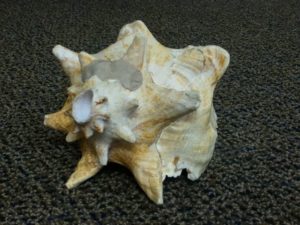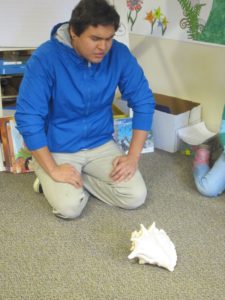The Gift of the Atecocolli

We are excited to have Alfredo Quiahuitl Villegas here for Summer Symposium 2016. This post, originally written in February of 2013, captures a memory of his original visit to Opal School. Thank you, Quiahuitl, for your collaboration!
On Friday, Levia shared a sneak peek at Morning Meeting.

Levia: A person from the Visitation Day yesterday found me and gifted this special conch shell to me, for us, for Opal 4. The man who gave it to me is named Alfie. He is the music specialist from the Ochoa School in Tucson, Arizona.
WK: They have one of those in Opal 3.
Levia: This one is special. It has a hole drilled out of it so that you can blow it like a trumpet. Alfie told me that the conch trumpet is a sacred object in the Nahuatl tradition, and since he saw so many traces of indigenous culture and learning in our classroom, he wanted us to have it. He said that in the Nahuatl tradition, no one owns the things they have, they are just taking care of them, and then they will gift them on to someone else. Alfie said he rescued this conch from a Goodwill store. He fixed a part of it that was cracked and brought it here, knowing he would find people who would appreciate it. So we’re going to have to take very good care of it.
AA: What makes it special?
Levia: Alfie said that when it is blown, the conch calls in the energy of everyone in the community. It brings all of the energy together and makes it stronger.
ER: Like the whoosh!
Levia: Right, that is exactly what I thought. He definitely gave it to the right community. He also
told me that there is a special way to store it. You have to keep the opening down, so the energy won’t escape, and the mouth piece has to face north.
AA: Why north?
Levia: I don’t know. I didn’t ask him. So, do you want to hear it?
All: Yes!
Levia: Does anyone here play the trumpet? That is how you have to blow it.
Chris: I do!
Levia: Wow, Chris, will you blow it for us? Maybe we should stand up because it is a special thing to hear the conch.
Chris blows the conch trumpet.
Levia: What was that like for you? How did it make you feel?
SBM: It made me feel tired, like my legs would collapse. I felt like it was taking my energy and putting it in.
AA: I felt lightheaded. The noise still traveled after it stopped. I kept flinching.
AB: I could feel it vibrating. It came up my whole body, not just in my feet.
SD: Thank you, Chris, for that beautiful sound.
ER: It was powerful and it made me feel weak.
RC: I felt it in my chest. It reminded me of a voice.
HH: It felt like the energy was building around us.
At this point in the conversation, Matt came in, and he had Alfie with him!
Matt: We could hear you blowing the conch from Purple Turtle Hall, so I got Alfie and told him he
had to come to the classroom.
Alfie listened while the students continued to reflect on the experience.

KB: The sound went into me. I felt the power.
WK: It was sort of scary, wild, powerful and out of your control.
TJP: It went through me and made me more relaxed.
JP: It sounded like a whale – you know, like the whale in the wall.
EJ: It was scary – all around us and wild. It made me tired.
WK: It was so unique. It was a new thing. It was safe and wild all at the same time.
AA: It was the whoosh in a different form. We all got it. We could all hold it – hold that sound with
us.
PG: In the movies they sometimes make a sound like that and it’s a call for a meeting.
SD: It was sucking
the energy out of you, but it was putting it back in. Like a refill. It’s a mix of emotions, unknown emotions, like I wanted to laugh and smile.
SBM: I agree with
SD. It was like a refill. I feel new and refreshed. Refreshing your energy.
NF: It felt like an earthquake, the vibration inside of me.
ER: It felt like an earthquake, but the noise says it’s not.
WK: It made me feel like I had just climbed a mountain, like I was high on adrenaline.
Now we invited Alfie to share with us.
Alfie: Hi, I’m Alfie. I’m from Tucson, Arizona and I am the music specialist at my school. That’s why I gifted the atecocolli to you. It is called an atecocolli in Nahuatl. That is the language of the indigenous people where I am from. I was feeling sick in there, like I was getting the flu, and now, hearing your words, your palabras, I feel better. This is like medicine to me. The atecocolli is from the people of Central Mexico and it is harvesting all of that good energy. Do you have any questions for me?
SBM: When would you
blow it?
Alfie: You can greet the sun, at running ceremonies, sweat ceremonies… by blowing it you are giving back to the earth. This is from the earth. We can gift it to each other.
ER: How old is this conch?
Alfie: It is as old as the earth. These objects are our abuelos and abuelas. When we blow the atecocolli, we blow it in all four directions: east, west, north and south. Then we spin in a circle and blow it up into the sky, spin in a circle and touch the earth and blow it to her, and then turn in a circle and blow it to the present space.
AA: Why do we have to
store it with the mouthpiece facing north?
Alfie: Did I say
north? It should face east, toward the
rising sun.
SD: What made you
interested in the conch shell?
Alfie: It is a tradition of my heritage and the heritage of a lot of the children at my school, the Mexica tradition. I see that you are working on colonization. People feel scared to talk about who they are, but they feel proud too. Our tradition is an oral tradition. Since you asked, I am telling you about it.
Then, Alfie offered, “Would you like to hear a song sung in
Nahuatl?”
All: Yes!
And Alfie sang for us.
We all noticed him tapping a beat out on his leg, and we joined in.
You can listen to Alfie’s song by clicking on the link below:
When Amy asked Alfie what the words to the song meant, he
explained that many of them were metaphors and many were dualities, like atl tlachinolli, the duality of water and fire. And another word that stood for the duality of us and the earth.
Levia’s reflection:
Sometimes at Opal School things happen, and you can’t explain why. Judy Graves taught me that these moments we call, “wondrous happenstance.” The gift of the atecocolli, and the time we had with Alfie in our classroom, this is wondrous happenstance. How will this experience affect our project work? How will this experience affect the perspective we take when we study the history of the United States? How will the energy of the atecocolli in our classroom affect us? How can this idea of duality inform our understanding of colonization and the history of our
country?
This exchange keeps ringing in my ears:
SD: What made you
interested in the conch shell?
Alfie: It is a tradition of my heritage and the heritage of a lot of the children at my
school, the Mexica tradition. I see that you are working on colonization. People
feel scared to talk about who they are, but they feel proud too. Our tradition is an oral tradition. Since you asked, I am telling you about it.
What does it mean to identify with the victims of history? And, maybe even more importantly, how can we be inspired by Alfie’s words, “Since you asked…”?
